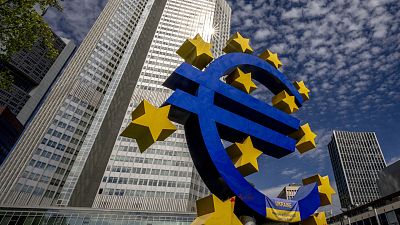Fears of a US recession are driving global market sell-offs. Equities dropped sharply, the dollar weakened, and bonds and the yen strengthened.
Global financial markets are witnessing a wave of risk aversion, intensifying dynamics that had already begun to emerge late last week when disappointing US economic data sparked fears of a recession in the world's largest economy.
Asian markets closed poorly, with Japan's Nikkei 225 Index down 12.4% to close at 31,458 points, the lowest level since December 2023.
European equity markets opened sharply lower on Monday. By 9:30 am Central European Time, the broader Euro STOXX 50 index was down 2.8%, reaching its lowest level since January and heading for its third consecutive day of losses.
Italy's FTSE Mib was the primary laggard, tumbling 3.5%, on track for its worst single-day drop since March 2023. Meanwhile, Germany's DAX, France's CAC 40, and Spain's Ibex 35 all fell 2.5%.
Banking stocks were hit the hardest. ING Groep's shares tumbled 6.8%, followed by Société Générale, which fell 5%, Deutsche Bank, down 4.4%, UniCredit, down 4%, Intesa Sanpaolo, down 3.9%, BNP Paribas, down 3.9%, and Banco Santander, down 3.5%.
In the bond market, yields declined along the German yield curve, with the 2-year yield down 6 basis points to 2.29%, its lowest since March 2023. The Bund yield fell 3 basis points to 2.14%, reflecting growing demand for safe-haven assets.
"Currently, the market sentiment indicates that weak data is no longer being interpreted as risk-positive due to weaker growth driving yields lower, rather than the disinflation story," wrote Mohamad Al-Saraf, FX and rates strategist at Danske Bank.
The euro rose against the dollar to 1.0950, reaching its highest level since March 2024, driven by the general weakness of the greenback. The Japanese yen saw five consecutive days of gains against the U.S. dollar, amid the unwinding of the "carry trade" that had pushed the yen to multi-decade lows in July. On Monday, the USD/JPY exchange rate tumbled over 2.4%, marking its worst session since late 2022.
What's happening to the US economy?
Recent US data revealed a worse-than-expected contraction in manufacturing activity last month, while the jobs report showed signs of worrisome cooling.
The US economy added only 114,000 new nonfarm payrolls in July, sharply down from the previous, downwardly revised figure of 179,000, and well below expectations of a 150,000 increase. Alarmingly, the unemployment rate unexpectedly rose from 4.1% to 4.3%, reaching its highest since October 2021.
Quarterly results from tech giants have been mixed, causing the S&P 500 index to close its third consecutive week in the red. Notably, Warren Buffett sold off almost half of his entire Apple stake, over $50bn (€46bn) worth of shares, bringing Berkshire's cash holdings to a record high of $277bn (€254bn).
The lower-than-expected economic data and the Wall Street pullback fuelled a rush to safe-haven assets, particularly US Treasury bonds, as investors increased their bets on Federal Reserve interest rate cuts.
Market-implied probabilities derived from interest rate futures saw a shakeup, with traders now almost fully pricing in a 50-basis-point cut in September, followed by another similar move in November, and a 25-basis-point reduction in December.
Last week, the Federal Reserve hinted at a likely rate cut in September. However, Chairman Powell dismissed the idea of a 50-basis-point cut.
All eyes are on Monday's release of the ISM Services PMI for the United States to assess whether the contraction in manufacturing is spreading to the services sector, potentially signalling an ongoing recession. However, consensus among economists expects a rise in the overall index from 48.8 to 51.
Yen rallies, dollar tumbles: What do analysts think?
The main winners in this phase of intensified global market selloff are bonds and the Japanese yen, reflecting significant movements in the interest rate market.
Chris Turner, ING's Global Head of Markets, wrote that lower US rates, more strategic Japanese FX intervention, and last week's hawkish hike from the Bank of Japan have all contributed to the woes in USD/JPY.
"We believe that this momentum of dollar weakness may continue in the short term, at least until the U.S. S&P PMI and ISM Index data for July expected today," wrote Luca Cigognini, market strategist at Intesa Sanpaolo.
According to Cigognini, the yen remains strong in this environment, but the market could remain highly volatile. The same movement was seen in EUR/JPY, which, after closing Friday at around 160.00, started today at 155.80, making a reversal seem unlikely.
Goldman Sachs increased their 12-month US recession odds by 10 percentage points to 25%. However, economist Jan Hatzius continues to see recession risk as limited, citing the overall soundness of the data and the absence of major financial imbalances. He also highlighted Chair Powell's emphasis on the Fed's ability to cut the funds rate by 525 basis points and quickly support the economy if necessary.
Danske Bank expressed a bearish outlook on EUR/USD for the second half of the year, primarily due to the belief that too many Fed rate cuts have been priced in over the next 12 months.
They find the repricing of Fed cuts excessive, noting that, despite signs of weakening, the US economy is not on the brink of collapse. "We expect EUR/USD to steadily decline towards 1.05/1.03 in the next 6 to 12 months," they wrote.















